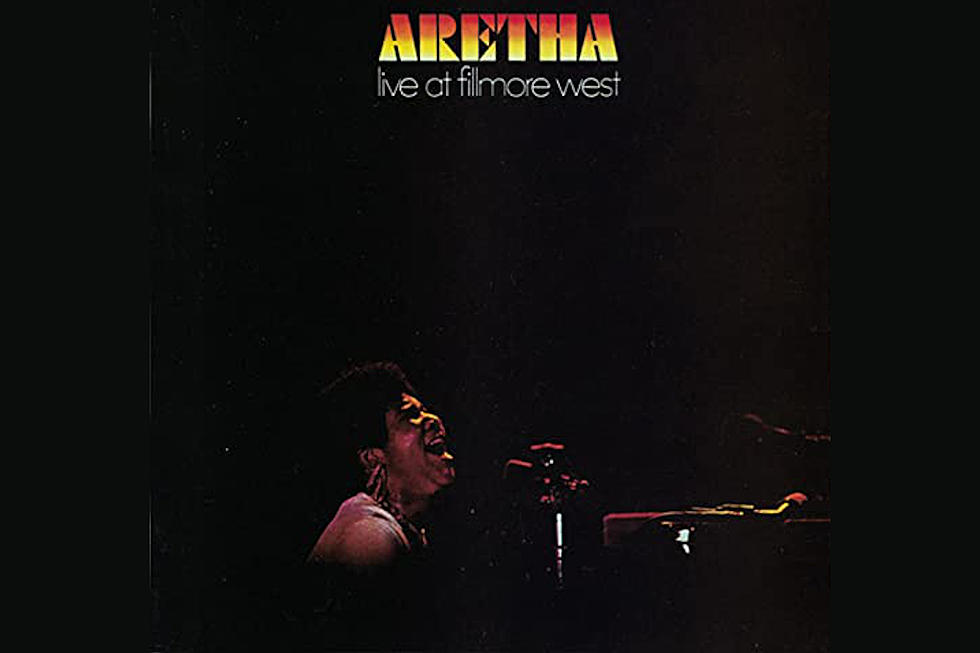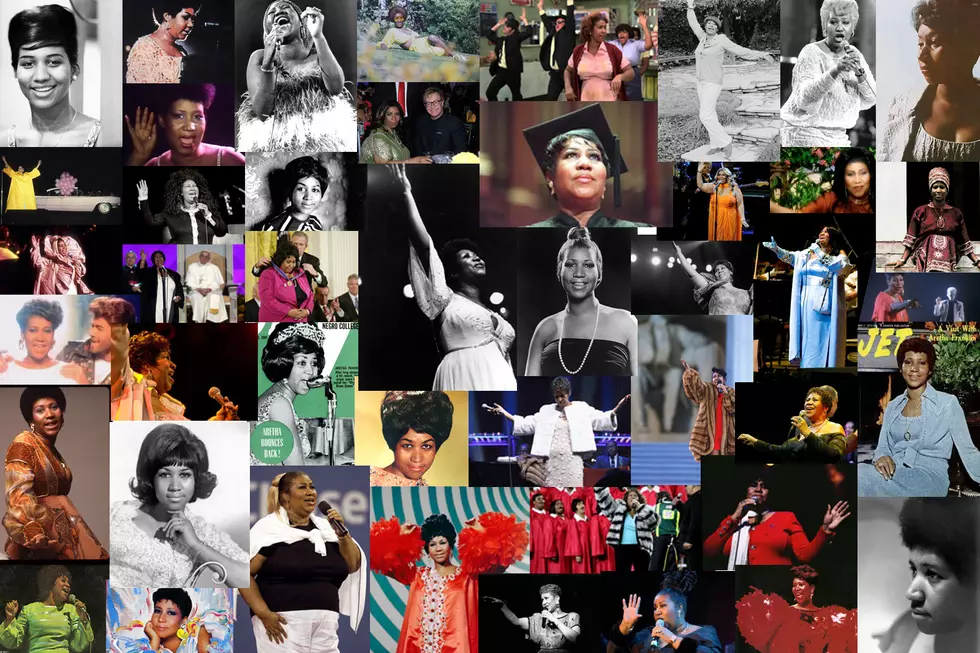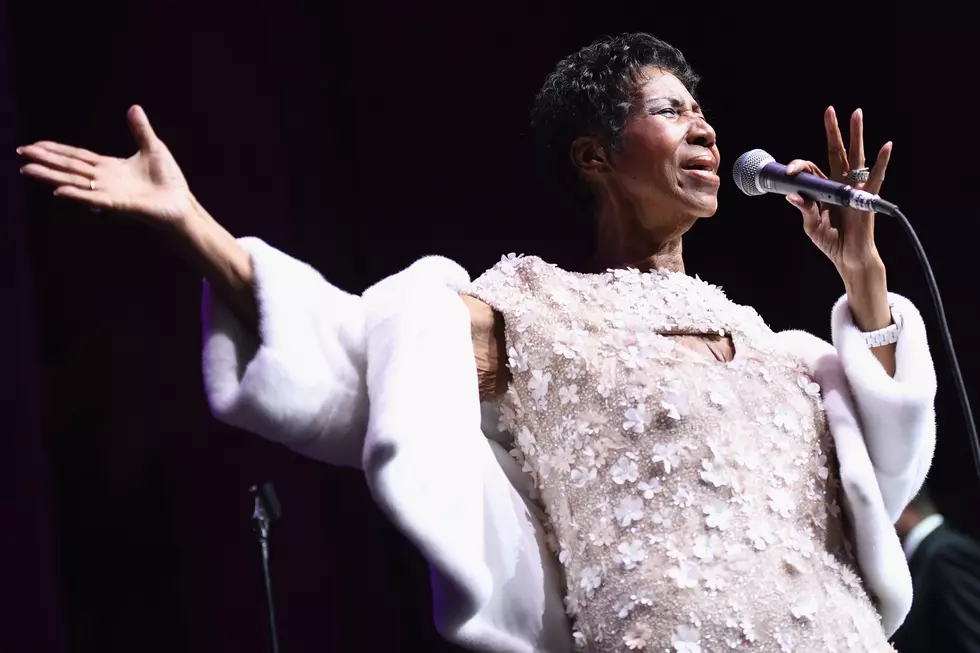
50 Years Ago: Aretha Franklin Gives Rock Soul on ‘Fillmore West’
“We’re gonna ask you to do just one thing, all right? And that’s just to relax, loan your soul to us for a few minutes, I promise you we’ll give it back. … I promise you when you leave here, you will have enjoyed this show, as much as any that you’ve had an occasion to see, all right?”
Aretha Live at the Fillmore West, which was released on May 19, 1971, commemorates Aretha Franklin at the height of her career. It also showcases the state of popular music at the shift from the idealistic '60s to the rawness of the '70s.
The first side of the album features mainly covers of hits by white male rock artists, which Franklin delivers in her own signature style. Turn the record over, and you hear the master proselytizing the secular into the gospel with her own hits. The album marked one of the many highlights of Franklin’s career and arguably captured her greatest performance of all time.
The live-album idea was born out of a strategic business deal between the Fillmore’s concert promoter, Bill Graham, and Atlantic Record’s determined executive, Jerry Wexler. Due to the intimate size of the Fillmore, they couldn’t just rely on ticket sales to make up the Queen of Soul’s performance fee, so the solution was to record a live album for Atlantic to cover the difference. The LP was recorded at the singer's three-night stint at the Fillmore West Concert Hall in San Francisco, spanning March 5, 6 and 7 in 1971.
In her 1998 autobiography, Franklin wrote, “I wasn't sure how the hippies reacted to me,” revealing her reservations about performing at the fabled rock venue. Nobody knew how the standard white Fillmore clientele would respond to her music or if they had ever even been exposed to her style of music before. In an attempt to reach the crowd, covers of songs that would appeal to them were incorporated, while also maintaining Franklin's soulful identity.
Listen to Aretha Franklin's 'Respect' From 'Live at Fillmore West'
Opening with a sped-up, almost punk-rock version her classic “Respect,” the singer put her entire backing group on full display. The renowned saxophonist King Curtis and his Kingpins were on top form as her backing band. The group was made up of drummer Bernard Purdie, bassist Jerry Jemmott, percussionist Pancho Morales and keyboardist Truman Thomas.
Also onstage were two trumpet players who were a staple of Stax Records' the Memphis Horns: Wayne Jackson and Roger Hops. Filling out the rest of the sound were tenor saxophonists Andrew Love and Lou Collins, Jimmy Mitchell on baritone sax and Jack Hale on trombone. Fresh off working with the Beatles and the Rolling Stones, Billy Preston served as the organist for the evening.
“Just a little something that we’re experimenting with tonight, so we hope you enjoy it as much as we’re going to enjoy doing [it],” was how Franklin prefaced her cover of Stephen Stills’ “Love the One You’re With.” In Stills’ version, a gospel-style choir is used in the chorus: “There’s a rose in a fisted glove, and the eagle flies with the dove / And if you can’t be with the one you love, honey, love the one you’re with.” This song isn't one you’d expect from Franklin, but her powerful voice and laid-back style transcends the original.
Her attempt to appeal to the hippie-filled San Francisco audience worked.
Listen to Aretha Franklin's 'Love the One You're With' From 'Live at Fillmore West'
With Franklin sitting at a Fender Rhodes, one of the most moving pieces in the set was her interpretation of Simon & Garfunkel’s “Bridge Over Troubled Water.” The Sweethearts of Soul - Franklin's background singers made up of Barbara Bryant, Margaret Branch and Pat Smith - begin the song with a soulful dirge: “Don’t trouble the water, leave it alone / Why don’t you, why don’t you let it be / Still waters run deep, yes, they do.”
With this section, the song is almost unrecognizable until Franklin begins to play the familiar melody.
Franklin had the rare superpower of covering songs in a way that made them sound like her own. This is one her greatest examples. Paul Simon’s song was derived from a Bach chorale, as well as a line from the Swan Silvertones' version of “Mary Don’t You Weep”: “I’ll be your bridge over deep water if you trust in my name.”
Simon & Garfunkel may have brought the song to masses, but Franklin took the song back to its gospel roots. Her touching rendition became a fixture in her live sets and reached No. 6 on the Billboard Hot 100 Chart in 1971.
Listen to Aretha Franklin's 'Bridge Over Troubled Water' From 'Live at Fillmore West'
Remaining at her piano, Franklin converted the Beatles' “Eleanor Rigby” into gospel funk. Moving in and out of the first person, she becomes Eleanor Rigby in the first verse: “I’m Eleanor Rigby, I picked up the rice in the church where the wedding has been.”
In the final verse, she separates herself from the character. "Eleanor Rigby died in the church and was buried along with her name / Nobody came," she sings.
Listen to Aretha Franklin's 'Eleanor Rigby' From 'Live at Fillmore West'
Franklin made another appeal to the audience with an expressive cover of Bread’s soft-rock hit “Make It With You.” She then closed out Side One of the album with her current single, a cover of Ben E. King’s “Don’t Play That Song.”
The second side opens with Franklin asking, “Does anybody feel like hearing the blues?” Swiftly moving from the church to the bedroom, Franklin’s “Dr. Feelgood” is laced much sexual innuendo. Her lyrical syncopation and staccato singing emphasize certain suggestive syllables, while the exaggerated moans and groans make the subject matter quite obvious. The audience eagerly cheers along as Franklin commands: “Don’t send me no doctor / Fillin’ me up with all of those pills / ‘Cause I got me a man named Dr. Feelgood / That man takes care of all of my pains and ills.”
She follows with the highlight of the show, an extended version of “Spirit in the Dark.” Clocking in at 13 minutes and 59 seconds, the song showcases Franklin's gospel-rock fusion and ability to vamp and grip the audience. Surprise guest Ray Charles adds an extra layer of funk to the song.
Watch Aretha Franklin Perform 'Spirit in the Dark' From Fillmore West
The singer encores with a cover of Diana Ross’ “Reach Out and Touch (Somebody’s Hand)” while graciously thanking the audience. Their rapturous response still resonates as a crowning moment in rock and soul's union a half-century later.
Throughout the album, the audience acts as an extra instrument. The crowd's enthusiasm creates a feeling of excitement and anticipation, and the electricity inside the Fillmore West remains palpable all these years later. That energy remains a testament to the artist and her prodigious talent.
Aretha Franklin Year-By-Year: 1961-2017 Photos
More From Kool 107.9










